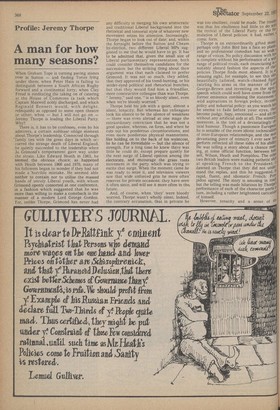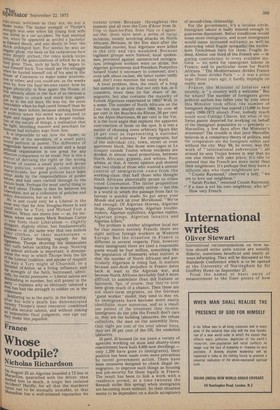Profile: Jeremy Thorpe
A man for how many seasons?
When Graham Tope is turning paving stones over in Sutton — and finding Tories lying under them; when Peter Hain is failing to distinguish between a South African Rugby forward and a continental lorry; when Clay Freud is meditating the taking on of catering at the House of Commons (a task which Captain Maxwell nobly discharged, and which Reginald Bennett would, with delight, relinquish) as opposed to some open theatre or other; when — but I will not go on — Jeremy Thorpe is leading the Liberal Party. Why?
There is, it has to be confessec,, even by his admirers, a certain noblesse oblige element about Thorpe's leadership. Connected through 'family ties with the great days in which occurred the strange death of Liberal England, he quietly succeeded to the leadership when Jo Grimond's temperament gave way under the strain. Like Edward Heath in 1965, he seemed the obvious choice; as happened with Heath between 1966 and 1970, many of his followers began to wonder if they had not made a ' horrible mistake. He seemed able neither to contain nor to utilise the massed bands of unruly Liberal youth, with whom Grimond openly consorted at one conference, in a fashion which suggested that he was more than willing to make a comeback in the manner of a modern Lord George Gordon. For, unlike Thorpe, Grimond has never had
any difficulty in merging his own aristocratic and traditional Liberal background into the rhetorical and tonsorial style of whatever new movement seizes his attention. Increasingly, Thorpe began to look out of date; and, within the fortnight before the Sutton and Cheam by-election, two different Liberal MPs suggested to me that he would have to go. It has to be admitted that, given the small size of Liberal parliamentary representation, both could consider themselves candidates for the succession: but the striking thing about their argument was that each claimed to prefer Grimond. It was not so much, they added, that they approved of his trend-hunting, or his wilder-eyed political and rhetorical hunches, but that they would find him a friendlier, more constructive colleague than was Thorpe. "Jeremy," said one, "is so bloody silent, even when we're bloody worried."
Thorpe held his job with a quiet, almost a silent, tenacity. But whereas his colleagues took his silence to be the silence of weakness — there was even abroad at one stage the extraordinary conviction that he was not a good speaker, whereas, on form, and when he cuts out his ponderous circumlocutions, and even more ponderous physical mannerisms, like holding on to the back of his waistcoat, he he can be formidable — but the silence of strength. For a long time he knew there was little he could do, except prepare quietly for the next surge of Liberal opinion among the electorate, and encourage the grass roots movement in the party which was trying to excite that surge. When the moment came he was ready to seize it, and television viewers saw that wide unforced grin he more often' reserves for private occasions: they have seen it often since, and will see it more often in the future.
And, of course, when 'they' were bloody worried, Thorpe wasn't wholly silent. Indeed, the contrary accusation, that in private he
was too ebullient, could be made. The trouble was that his ebullience had little to do wi° the revival of the Liberal Party or the for mulation of Liberal policies: it had, rather, e comic form.
Thorpe is an extraordinarily gifted
perhaps only John Bird has a face so plastic' and no professional comedian has so wide 3
range of voices. No policy discussion with hire
is complete without his performance of a wale range of political rivals, each enunciating tb.e suitably absurd fashion the aspects of the policies Thorpe finds most absurd. It is se amazing sight, for example, to see this shill beautifully tailored, watch-chained figlle
twirling his arms in the manner of Lore George-Brown and inventing on the spot! speech which could well have come from thil;
former eminence combining the statement el wild aspirations in foreign policy, incoMet policy and industrial policy: as you watch blee
he seems to fade before your eyes, the become pudgy, lispy, emotional — and all thit without any artificial aids at all. The mimic
moreover, is the tool of a devastatingly cel: deal humour. Though a passionate Europea.,'' he is sensible of the more idiotic technicalitir of inter-European relationships, and the Mast devastating piece of mimicry I ever saw 111111 perform reflected all these sides of his abilitY. He was telling a story about a chance meet', ing, at some official function, between hilly,' self, Wilson, Heath and Pompidou. The ottl,e',
two British leaders were making pathetic OS'
at speaking French to the President. It dawned on Thorpe that they did not under stand the replies, and this he suggested, ill rapid, fluent, and idiomatic French: Porn; pidou agreed. The story is amusing in itsetl:. but the telling was made hilarious by Thong:5 performance of each of the character parts turn, including a rather heightened caricature of himself.
However, tenacity and a sense of the ridiculous, welcome as they are, do not a leader make. The darker strength of Thorpe's
strength was seen when his young first wife was killed in a car accident. He had married late, when he appeared as settled a ,bachelor as Edward Heath, and was deeply in love: the Shock unhinged him. For weeks he was an elegant ghost, the lines on his cadaverous face more deeply etched, the once quick steps halting, all the gesticulations of which he is so fond gone. Then, inch by inch, he began to haul himself back. You could see the struggle When he hauled himself out of his seat in the House of Commons to make some interven tion or other; and you could see, as the weeks
went by, how the haul became easier, how he ?'.egan physically to flow again: the House, at irst uneasily silent in the face of so obvious a grief, began to attack and mock him again,
Just as in the old days. He was far, far more
,rtirmidable when he had cured himself than he had ever been before, because sinking himself In Politics when his mind was attuned to aepth and tragedy gave him a deeper realisatLion of the nature of things, a realisation that his light, birrelling manner and penchant for humour had hitherto kept from him. It is impossible to say how the leader, or even one of the members, of a small party
Would perform in power. The difference of
Magnitude between a minuscule and a large Political organisation is too great for any effective comparison to be made. Nor is this a Matter of devising the right or the wrong P°Iicies: of course a small party will devise fl any policies, some good, some wholly 'MPracticable, but good policies have been swept aside by the responsibilities of power before and bad ones carried through to the tatute book. Perhaps the most useful thing to !Ge said about Thorpe is that he believes his Liberalism, not as a collection of policies and Policy documents, but as a faith. He is and could only be a Liberal in the sarne way th,at Sir Alec Douglas-Home Is and could only be a Tory, and Michael Foot a s neialist. When one meets him — as, for insance, when one meets Mark Bonham Carter One feels their Liberalism — slightly `rogant, slightly elitist, but fundamentally tit.:Tarie — in the same way that one notices tio„T Clothes, or their mannerisms — e. "am Carter hunting vaguely for his arettes, Thorpe shooting his immaculate shirt Cuffs before tackling his soup. Noticing ,"ls inbred attitude is important: it demons .rates the the way in which Thorpe feels the life °1 the Liberal tradition, and speaks of Asquith Way a Tory might of Churchill, or a
the of Attlee, as a living influence; and
t t"e strength of the faith, buttressed, admit hy, social pressures — Liberal salons are irninishing in number, but still potent in the Party — explains why so obviously talented a Irian has had the strength to soldier on in the Wilderness. Soldiering on in the party, in the leadership, after his wife's death has demonstrated ja,, ;',enly Thorpe's inner resource: combined with .his natural talents, and without risking. an impossible final judgment, one can say he make him papabile.



































 Previous page
Previous page